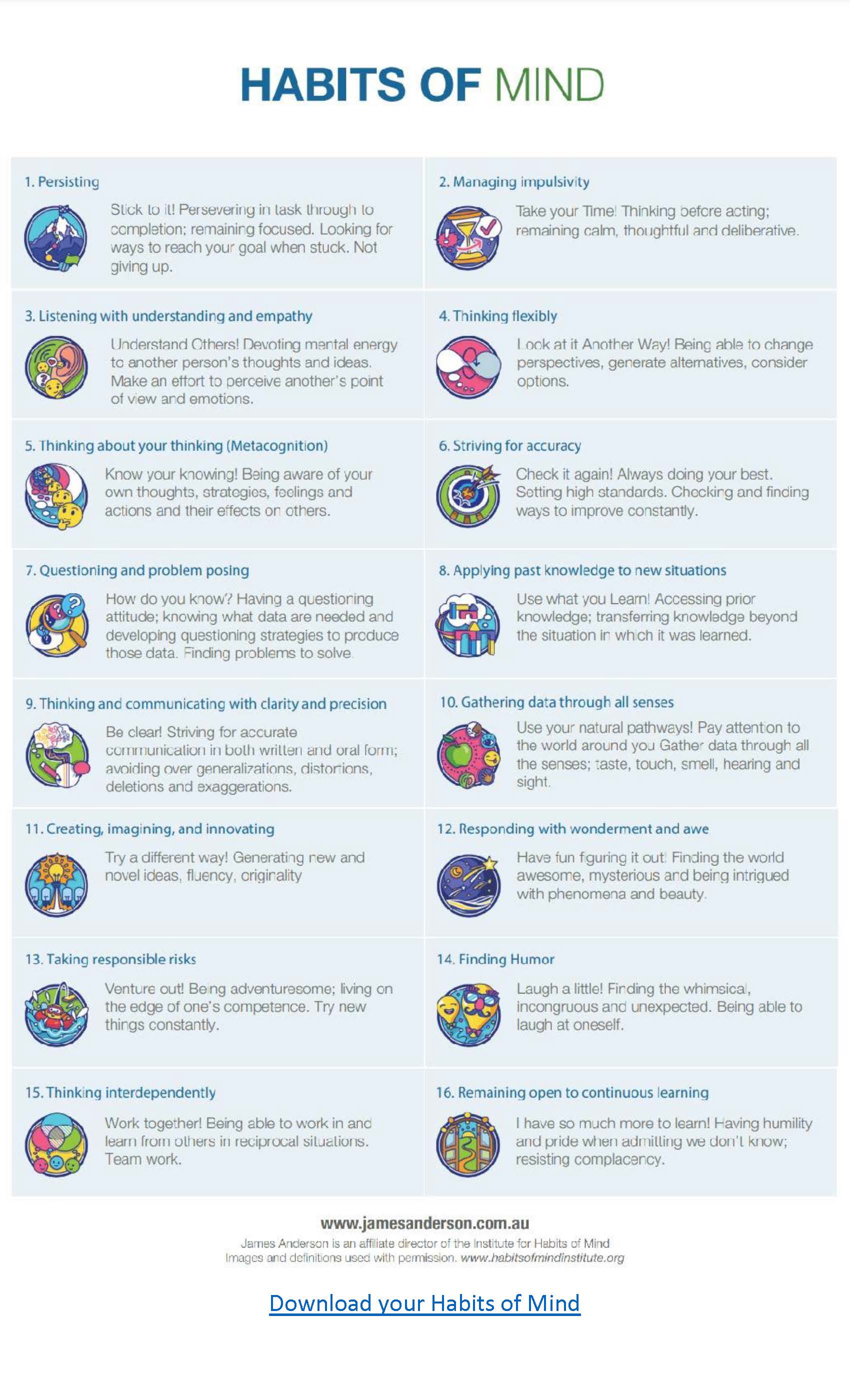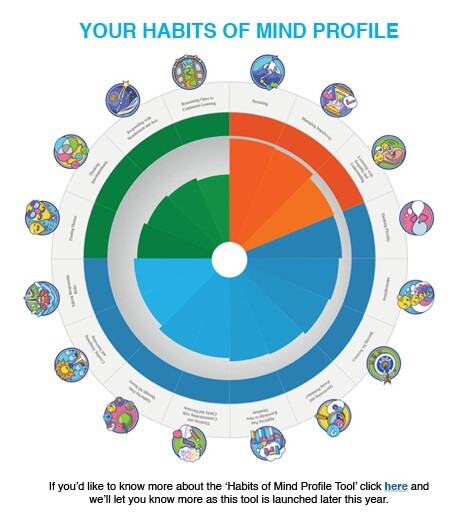Future Proof your Students: The Role of Learnership and Habits of Mind
The Habits of Mind are one of the true classics in education. Described by Art Costa and Bena Kallick, these 16 dispositions define the effective, efficacious thinker. They are the dispositions of an expert problem solver, a thoughtful decision maker and a creative thinker. They promote strategic reasoning, insight and perseverance. And they describe how successful problem solvers behave when they are in their Learning Zone.
It’s not surprising that the Habits of Mind should form a central role in Learnership. In fact, fostering a good understanding and appreciation for these Habits of Mind is an important part of how teachers can help students become skilful learners. As part of my Learnership Intensive I’ll show you how to work with the Habits of Mind help your students become more skilful learners.
Habits Of Mind and the Skilful Learner
How do the Habits of Mind help turn students into skilful learners? First, it provides a shared language for learning in the classroom.
The Habits of Mind build a language and vocabulary around learning that forms the basis for understanding how skilful learners use their minds well. In schools and classrooms where the Habits of Mind are used, you can hear parents, teachers and students all using the same words to discuss learning, which creates more understanding and places a higher value on these behaviours. Most importantly, the language of the Habits of Mind gives Beginning Learners the "cognitive anchors" to describe their learning process. As teachers we use these anchors to help guide learners to first reflect, then to predict and select the Habits of Mind that will work best for them as they face challenges in the classroom and with their own learning.
Most importantly, the language of the Habits of Mind gives Beginning Learners the "cognitive anchors" to describe their learning process. As teachers we use these anchors to help guide learners to first reflect, then to predict and select the Habits of Mind that will work best for them as they face challenges in the classroom and with their own learning.
Developing and Improving the Habits of Mind
Of course having the right language is great, but the real power of the Habits of Mind comes when we shift from merely naming and "using" the Habits of Mind, to developing and improving them. It’s at this stage that students learn to focus not just on what they are learning, but also on getting better at how they are learning.
As teachers we stretch students by providing challenges that demand this increasingly mature application of the Habits. We then intentionally scaffold and guide this development so students learn how to engage in the Habits of Mind in more sophisticated ways – for example, to get better at Managing Impulsivity, and the improve how they Strive for accuracy.
As we guide our students to become more skilful learners, they start to see how developing their Habits of Mind makes hard things easy. Students see that to continue to improve their standards, they need to continue to improve their Habits of Mind. They begin to appreciate that "what got them here, won’t get them there".
It’s at this point that we begin to guide our students to take charge of their own Habit of Mind – both their use and continued development.
Independent Learners set goals that are beyond their current abilities. They recognise that to achieve these goals, they have to improve their Habits of Mind. Teachers guide learners to focus not just on what they are learning, but also on how they are learning. Learners identify which Habits of Mind they need to develop in order to reach their goal and set about developing the behaviours that will allow them to reach their goal.
But developing your Habits of Mind in response to your goals doesn’t future proof you. It only allows you to react to the future when it arrives. Agile Learners don’t react, they prepare!
The Agile Learner – Future Proofing Your Learning
Agile Learners take the Habits of Mind to the next level. Rather than reacting to learning challenges, they are proactive. They appreciate that they live in a volatile, uncertain, changeable and ambiguous world (VUCA). They know they can’t predict the challenges that they’ll face in the future, but they can prepare for them.
Agile Learners see their Habits of Mind as an asset. They see that time invested in developing their Habits of Mind now, is time invested in preparing for an unknowable, but challenging future. The Agile Learner asks, ‘What challenges can I take on today that will best allow me to develop my Habits of Mind for tomorrow?’
While the Independent Learner develops their Habits of Mind to achieve an immediate goal, the Agile Learner takes on challenges to develop their Habits of Mind – and in doing so proactively prepare themselves for a challenge they’ll face in the future. And when that future arrives, the Agile Learner will be in a strong position to confront those challenges and take them in their stride. They become future proofed!
Habits of Mind Profile: SNEAK PEAK
Our students aren’t going to start off as Agile Learners, or even Independent Learners. But as teachers we can help get them there. So how do we help students learn to understand and cultivate their Habits of Mind?
The new Habits of Mind Profile tool (launching later this year) helps students take a "snapshot" of their Habits of Mind by giving them a clear picture of where they currently sit in their development of their Habits of Mind. An example of a Habits of Mind Profile is shown below.
Learners can use their profile, like the one above, to review their own Habits of Mind. Working through it they can easily identify their current strengths and weaknesses, see areas for improvement and watch as they develop these areas. As they develop, learners will begin to use their Habits of Mind profile to identify which Habits of Mind they need to work on, and to identify the types of challenges that will provide them with opportunities to develop those Habits.
This exciting new tool will be explored as part of my 4-Day Learnership Intensive from May 31st to June 3rd. At this intensive I will also show you how to help your learners embrace the Habits of Mind not only as a language of learning in your classroom, but also as a development tool to succeed in school and life.
If you’d like to learn more about Habits of Mind Professional Learning Opportunities click here to read more and access upcoming events.
Best Wishes,
Stay connected with news and updates!
Join my mailing list to receive the latest news and updates about mindset, Habits of Mind, Learning Agility and more.
